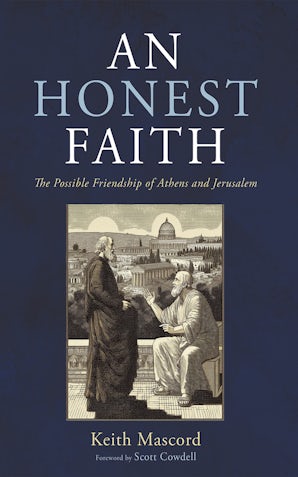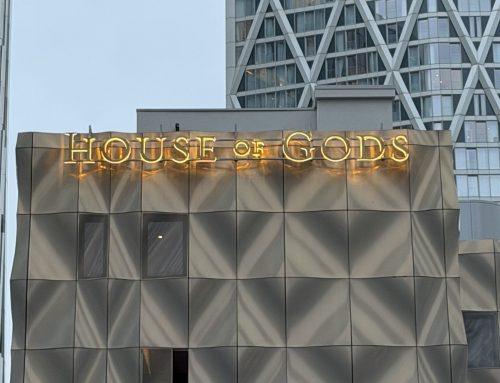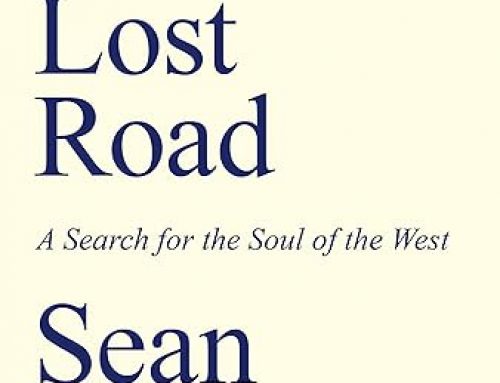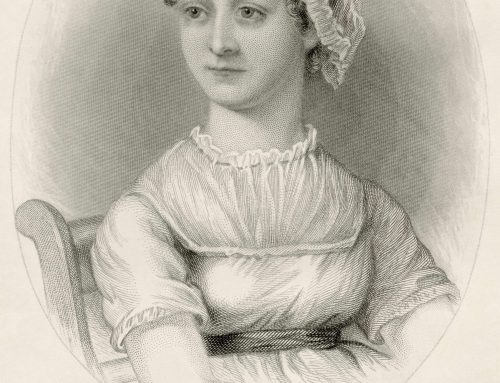Book Review: Keith Mascord “An Honest Faith: The Possible Friendship of Athens and Jerusalem’
Review by David Ellis
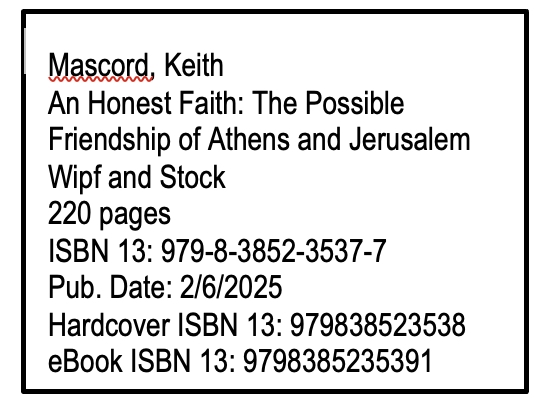

David Ellis was baptized a Roman Catholic, confirmed into the Anglo-Catholic tradition, and then by good fortune continued to enjoy Choral Evensong most weeks in University Colleges, France, Spain, a BCP Church and finally at an English Cathedral, all this interrupted only by 15 years in Islamic countries. Choral Vespers in Latin has always been his favourite no less for being unintelligible. A few years ago he started reading the Bible almost daily.
Keith Mascord faces up to the challenge to orthodox faith put by literary-historical analysis. First he “deconstructs” the Bible as history, and then re-establishes it as “mythology”, truthful, even if not true. Then he starts a discussion about the way ahead.
This book reminded me of a Pauline Epistle for example 1 Corinthians, with a personal introduction, a teaching agenda, and then some theology. But above all it is, like the Epistles, a missionary not an academic work. The Author is the yeast, sharing his own struggles as he progresses from devout Evangelical to lecturer in Philosophy, and then to an Anglican Priest delisted for his liberal views. Like Paul he attacks his enemies.
The ”deconstruction” of the Bible is the longest section. He is an experienced teacher and covers ground with a light touch. If you want to dig deeper, there are more than 300 references but it can also be a holiday read available on Kindle. He finishes this section by comparing the Bible to the Lord of the Rings or the Narnia Chronicles, a bit of uncharacteristic exaggeration, but he wants to make you uncomfortable.
Nor in his view is the Nicene Creed useful as core belief including as it does doubtful facts like the Virgin Birth and the Resurrection of the Body.
The second part of the book “Reforming Jerusalem” is a “reconstruction”, as he puts it moving from naivete to appropriation. The Old Testament is a sophisticated post Exilic work written tens of hundreds of years after the event. The New Testament wrote itself. Jesus like Moses was transfigured, like Elijah he performed miracles, and as the Holy One He would not see corruption. As the eschatological hopes fade, the Christology expands.
So, the Biblical Authors are inspired teachers, not wayward historians. Despite this rehabilitation, he sees a hermeneutical, and theological gap.
Throughout the book Keith Mascord is encouraging the reader to participate. Taking up the challenge, I read the Bible from start to finish, not for the first time, but now with more confidence in myself. Rather than Lord of the Rings, I would compare it to Wordsworth’s autobiography the Prelude, subtitled “Growth of a Poets Mind”, psychology expressed within a framework of real experiences. Anyway, the point is, I started the second section from a similar premise as the Author.
So, what is the Author’s way ahead? He starts by saying what he would not do, by rejecting both the Fundamentalist and the Conservative Anglican approach as characterised by GAFCON (the Global Anglican Future Conference).
The Fundamentalists have he acknowledges the simplest approach. It is after all how his parents brought him up. But he doesn’t think it has a future. If any “fact” is in doubt, so is the whole Bible. I disagree. If you need to know the volume of your DHL parcel in cubic centimetres but your tape measure is in inches, it’s quicker and more accurate to do the whole calculation in inches and then make one metric conversion at the end. Similarly with the Bible rather than interpreting each verse, read all of it, and then absorb it as a whole at the end. The early theologians discovered this. Origen’s verse by verse allegorical approach was eventually rejected. Marcion was an extreme case redacting the whole of Old Testament and more. In the end the Canon was selected by consensus leaving out the Gnostic gospels and was then interpreted as a whole. So, in my view the Fundamentalists have a point. The metaphors are left intact. It is elegant and it works.
As for GAFCON the Author admits that reestablishing some orthodoxy is a good idea, but he does not agree with their interpretation of Article VI of the Thirty Nine Articles, in particular that their views on marriage, sexuality and gender have been proven “as necessary for salvation”. This issue loomed large in his ministry, and in this book, and for him it’s one strike and out. I disagree. If the law of a country allows same sex marriages, then the Church should respect the law, as the Bible makes clear. Equally another country might forbid it. The Archbishop of Canterbury should not get involved. Taking the Bible as a whole, Paul included, you have to stare into the tea leaves to make this into a core issue for the whole Church.
The Author then makes various suggestions on the way ahead, the main ones being Panentheism as a Theology, and the need for a Doctrinal review.
A recurring theme is that Philosophy is an essential tool for this task. By Philosophy, I don’t think he is disagreeing with Paul’s rejection of the “wisdom of the wise” in 1 Corinthians 1. Nor is he advocating any of the standard “isms” Platonism being the obvious one, rather he wants to use the methods of logic and dialectic.
His Panentheism was inspired on a trip to Iona by Celtic spirituality, expressed as “God is omnipresent, and life itself is the primal sacrament, the visible manifestation of invisible grace”. He gives a nod to the Trinity but with typical humility says he doesn’t “have the skills to decide whether that doctrine helps us understand Jesus or not.” I disagree. The Apostles Creed is no more than doubtful fact, the Nicene Creed contains too much of the same, but the Athanasian Creed, not mentioned by him or by the Church anymore, seems to me a brilliant and rigorous definition of Panentheism. Keith Mascord, if anyone, could popularise it.
The Author’s other key proposal is for all Christian doctrines to be “re-examined under the microscope” with the help of scholars, poets, musicians and artists. I disagree. Even if the Anglican Church was homogenous, which it never has been not even in the 16th Century, no institution can these days dictate from the centre. Keith Mascord is scathing about Clerics who finish their training “deconstructed” but haven’t the courage to follow this through in their ministry. I disagree. The critic can live with his annihilation of dogma, but his congregation is more fragile.
Another recommendation is a Charter for Congregations like the one from his Parish in Sydney. I disagree. It describes well the Anglican Churches I have come across, a decent congregation and a talented clergy, proclaiming what is no more than a Christian branding of Humanism. In these Churches, and in this book, there are more poems than quotes from the Bible.
I have disagreed with just about everything the Author has suggested on the way ahead. For him this would count as a complete success. Whoever you are, this book will make you think and help you stick to your findings.
End of review.
—————————————
Reflections:
But finally, Keith Mascord asks the reader “Do you think that Christian churches, organizations, and denominations can change for the better, and if so, how and how quickly?”
Yes, I do, and with the right approach, quite quickly. So here goes.
The Liturgical Calendar should be supplemented, replaced even, by a schedule of Bible readings, and whole Books not just anecdotal lessons. The congregation should take it in turns to read out loud. This experience of reading together would make Doctrine unnecessary. You can’t anyway find a rigorous Theology from in the Bible, the Trinity being the most obvious example. Sometimes you think Paul is coming up with something, but then it turns out to be another intoxicating rhetorical device. To make time for Bible reading, the Liturgy would need to be slimmed down, perhaps only being used on high days, and lifetime events.
With this model, the Clergy no longer face the dilemma of teaching one thing whilst believing another. They have enough on their plate as managers. The format would also be well suited to a mixed church and online congregation.
How quickly could this be done?
Before reading this book, I had “deconstructed” by reading the Bible end to end. To save time I had a rule that I would not look up anything, but I did not need to, my deconstruction was more complete than the Author’s. I spare you the details, but I am now precluded from going to Church which for me is a loss. So, to achieve anything constructive, this process must be conducted within a community. As Paul says in 1 Corinthians, Christ can only be found in the body of the Church, excluding himself even.
More cerebral congregations could go further if they wish. ChatGPT or Gemini would be enough to define terminology for example soul, spirit, mind, body flesh with just the Bible as input. With a better AI licence, and language model, the ology’s could also be explored …soteriology, eschatology etc. For Protology and Cosmology however, I would stick to Science and for Ethics to the Law. Science and Religion are different metaphors with a different purpose. A Bible-centred Church could also share readings with those other great scriptural faiths, Islam and Judaism.
The final question – how quickly could this be achieved? This is where the Church hierarchy comes in.
The Thirty Nine Articles need to be amended, leaving only Article VI “Of the sufficiency of the Holy Scriptures for Salvation. HOLY Scriptures containeth all things necessary to salvation: so that whatsoever is not read therein, nor may be proved thereby, is not to be required of any man…”. These Articles were made law in 1571. They balanced Lutheran and Catholic doctrines, a political compromise typical of the Anglican Church which has always been above all practical. But the Theology is a fudge, and this fudge has become a stumbling block. A good example is Article I the Trinity which cannot be established from the Biblical Canon. The Table of Bible Books should replace the details of the Calendar.
Once the Archbishop has done this, Bishops should be allowed to “liberate” their Clergy from the Liturgy at a pace they think is appropriate for their particular congregations.
The last word is Article XX ”Of the Authority of the Church”. I removed it but it has bounced back.
“The Church hath power to decree rites or ceremonies and authority in controversies of faith; and yet it is not lawful for the Church to ordain anything contrary to God’s word written, neither may it so expound one place of Scripture, that it be repugnant to another. Wherefore, although the Church be a witness and a keeper of Holy Writ: yet, as it ought not to decree anything against the same, so besides the same ought it not to enforce anything to be believed for necessity of salvation.”
David Ellis
Feast of the Holy Cross
September 2025
